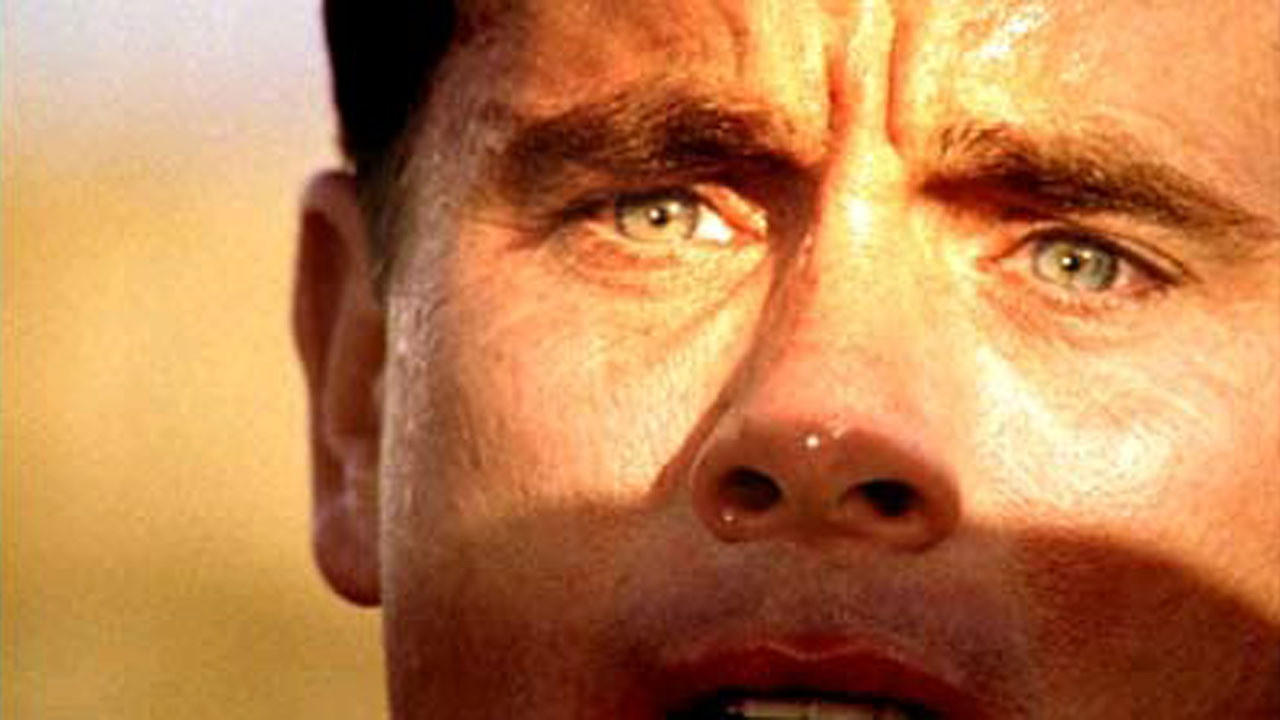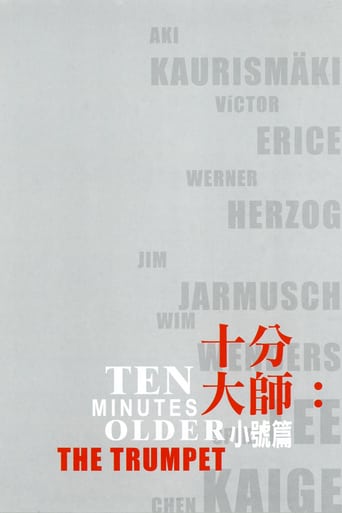

Please don't spend money on this.
... View MoreGripping story with well-crafted characters
... View MoreWhat a freaking movie. So many twists and turns. Absolutely intense from start to finish.
... View MoreEasily the biggest piece of Right wing non sense propaganda I ever saw.
... View MoreTEN MINUTES OLDER "The Trumpet" is a compilation of seven ten-minute films by various noted directors that all deal with the passing of time. This is one of such two 2002 projects produced by Nicholas McClintock, the other is subtitled "The Cello".In Aki Kaurismäki's "Dogs Have No Hell", Markku Peltola is released from jail and has ten minutes to convince Kati Outinen to marry him and board a train to Siberia. There's little explanation of who these people are, why Peltola was in jail or why they must go to Siberia, but the film does compress the Finnish director's style into a short span with its deadpan humour, stony facial expressions and even a performance by a morose rock band.As Víctor Erice's "Lifeline" begins, a baby's swaddling clothes are stained with blood because of a rupture. The film tracks the suspenseful minutes between the accident and the time that the large household discovers it and saves the child. The film is set in a Spanish village in 1940 and the silence (there's only a couple of lines of dialogue at the end) and clockwork-like buzz of rural life (reaping grain, sewing with a machine) make a real impression over the other films here.The main character of Jim Jarmusch's "Int. Trailer Night" is an actress (Chloe Sevigny) on a ten-minute break in her trailer while shooting a film. Though these ten minutes are all the time she gets to herself the whole day, her break is constantly interrupted by costume and mic checks and ultimately her dinner is delivered too late for her to eat it. Jarmusch is apparently showing us that a star's life is not an easy one, though considering the enormous salaries that these professionals command, it's hard to really sympathize.Wim Wender's "Ten Minutes to Trona" depicts an American businessman's desperate attempt to reach a hospital after unknowingly ingesting a plate of cookies dosed with some kind of hallucinogen. As he speeds down a desert road, various camera effects represent his warped perceptions, which range from horrible visions to moments of idyllic beauty. There's such a realism to this that one wonders if it is based on a personal experience by Wenders.Werner Herzog and Spike Lee chose to make short documentaries. Herzog's "Ten Thousand Years Older" visits a Amazonian tribe that had been contacted by the outside world in 1981 (thus being pulled millennia into the future in the blink of an eye). The first portion of the film consists of footage from the 1981 contact. In the years since, much of the tribe had been decimated by diseases to which they had no resistance, but Herzog captures an interview with two of the men two decades on.Spike Lee's contribution "We Wuz Robbed" deals with the 2000 presidential election and Al Gore's loss to George Bush in Florida. Lee interviews Democrat strategists about the agonizing wait for the figures to come in. As outraged as I was at the outcome of this election, I find this film to have little to no redeeming value and regularly skip it on rewatchings.Finally, Chen Kaige's "100 Flowers Hidden Deep" deals with the Chinese state's destruction of Beijing's traditional neighbourhoods in order to build skyscrapers. A middle-aged Beijing man asks a removals team to help him take his things from his old home to his newly built high-rise. When they arrive, they find only a vacant lot and it turns out the local man is quite mad. Through a computer-graphics overlay, Chen shows us what lovely buildings and streets were in this empty plot of land before the authorities demolished it all.In spite of the talent enlisted for this project, the films here are generally not very deep. I would say that only the Herzog, Erice and Chen films are memorable, but it's hard to be enthusiastic even about these. I think it would appeal mainly to completists of one or more of the directors represented here, but it's hard to represent it to more casual fans.
... View MoreHas its ups and downs. Some good short films - Werner Herzog and Wim Wenders are especially good, and Jim Jarmusch is as sensitive and subtle as always. Some don't quite make the grade - Victor Erice's piece is irritating and self important, and Spike Lee's is quite interesting, but doesn't do well in the context of the films and in its ten minute space.The anthology is definitely worth watching if you're a fan of any of these directors, or of art-house cinema in general, and if you don't mind stories with no real plot to speak of. Generally speaking, I prefer more versatile film anthologies like Paris Je T'aime and To Each His Cinema, which offer a wider range of styles.
... View MoreA pretentious but - to varying degrees - watchable collection of mostly pointless "stories".But let's start from the top.Kaurismaki: If one ever wondered what Finnish love/romance was like, perhaps this dull little oddity is some indication. Subdued feelings, non-emotions, apathetic faces and a very depressing prospect of moving from Finland to Siberia! I guess the sequel to this story will be "For Our Honeymoon We Move From Siberia to Greenland". Aki obviously had no clue what to write for this little movie, so he just made up some half-assed non-"story" centering around a band he particularly likes (or maybe they're his friends) because we get to watch them and listen to their music more than the two principal characters.Erice: First off, I've never heard of this guy before and now I know why. Nice black&white photography and pretty much nothing else - unless being bored silly can be considered an asset. But you'd be surprised how many movie-critics and film students love boredom in movies so I hotly recommend Erice's 10-minute snooze-fest to those two groups of humanoids.Herzog: Not a movie but probably a slice out of his documentaries about tribes in South America. This isn't a short film but a report, but considering how dull the first two entries were, Herzog's bit is almost refreshing and does have some interesting moments, and if nothing else fits into the movie's pretentious "time" concept very neatly.Jarmusch: As was to be almost expected, this once-interesting film-maker (with the brain of a peanut; a talented idiot savant) serves us yet another doze of pointlessness. He has become lazy and can't be bothered to write anything interesting, either for his own movies or a collection such as TMO. The only bright side in watching how a dumb veggie actress spends 10 minutes in a trailer is that she is played by the lovely Chloe Sevigny. Otherwise, skip this nonsense. Oh, and btw: I don't believe that any young actress listens to classical music; was Jarmusch trying to be surreal by making Chloe listen to that kind of music? Does Lindsey Lohan perhaps listen to opera? Maybe Drew Barrymore is a jazz fan? Who am I to say they aren't?!Jim Jarmusch is a moron. Oh, right... I already mentioned that...Wenders: Here is the actual shock of the whole movie: Wenders can actually make something good!!!!!? Everything else I've seen from this overrated charlatan has so far been dull and pointless. However, this short little story is done with style(! atypical) and is the best part of the movie. It leaves one wanting to see more of it, even though the story has a resolution.Spike Lee: Oh, dear Lord What can I say here? Lee makes anyone seem talented by comparison. Like Herzog, he chooses not a story but submits a report and a left-wing political propaganda report at that! CNN, but in black and white, and one-sided, of course. Naturally, "We Wuz Robbed", the retarded title of this little sleep-inducer, is about how the poor, gullible and infinitely idealistic Democrats WUZ ROBBED by Bush and his EVIL EVIL team of THIEVES. This is by far the dumbest and dullest entry in this movie, and I had to utilize the fast-forward button so as not to doze off. Spike Lee truly is a product of Affirmative Action. God knows how many really talented (black) directors never had a chance to make movies because this pretentious and talentless little runt keeps getting opportunity after opportunity to make them. And he gets it wrong EVERY TIME! Now that does take some kind of talent, right? Kaige: The Chinese story has a solid premise. It's okay, nothing more.All in all, there are many and far better movies to spend your time on, but if your time isn't that valuable (as is apparently the case with my own) you can check this little film out."Ten minutes sure can be an eternity in the hands of anti-masters of cinema. Time is precious. Waste it on better movies." - Fedor Miklowitz, 1588
... View MoreA dream come true for art-house film buffs, and anyone whose out looking for an interesting way to spend 90 minutes. This is perhaps one of the most amazing collection of short films. The secret lies in the vast variety of genre and style of the films. From pure eye-candy to dramatic documentaries. In a collection like this, there is no such thing as "out of place". I found all the films enjoyable and interesting. For me, the weakest segment was the Wim Wenders film. It felt like an episode of a made-for-TV mini-series-road-movie. Another let down was the Aki Kaurismaki segment, maybe it's because this was my first Kaurismaki experience, I didn't really "get it". The most powerful being Chen Kaige's nostalgiac reflection of the ever-changing city of Beijing. The segments in order of preference: Chen Kaige, Werner Herzog, Victor Erice, Spike Lee, Jim Jarmusch, Wim Wenders, Aki Kaurismaki.My preference could change after multiple viewings. I strongly recommend this collection to film-lovers. Can't wait to see the other collection: "The Cello"
... View More